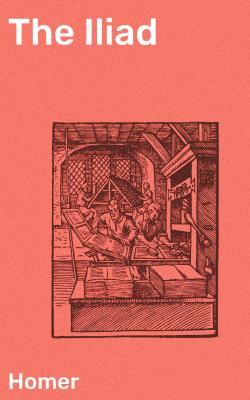The Iliad. Homer
Читать онлайн.| Название | The Iliad |
|---|---|
| Автор произведения | Homer |
| Жанр | Языкознание |
| Серия | |
| Издательство | Языкознание |
| Год выпуска | 0 |
| isbn | 4057664186300 |
Address with words persuasive, nor permit
To launch their well-trimm'd vessels on the deep."
She said, nor did Minerva not obey,
But swift descending from Olympus' heights
With rapid flight she reach'd the Grecian ships.
Laertes' son, in council sage as Jove
There found she standing; he no hand had laid
On his dark vessel, for with bitter grief
His heart was filled; the blue-ey'd Maid approach'd,
And thus address'd him: "Great Laertes' son,
Ulysses, sage in council, can it be
That you, the men of Greece, embarking thus
On your swift ships, in ignominious flight,
O'er the wide sea will take your homeward way,
And as a trophy to the sons of Troy
The Argive Helen leave, on whose account
Far from their homes so many valiant Greeks
Have cast their lives away? Go quickly thou
Among the multitude, and man by man
Address with words persuasive, nor permit
To launch their well-trimm'd vessels on the deep."
She said; the heav'nly voice Ulysses knew;
Straight, springing to the course, he cast aside,
And to Eurybates of Ithaca,
His herald and attendant, threw his robe;
Then to Atrides hasten'd, and by him
Arm'd with his royal staff ancestral, pass'd
With rapid step amid the ships of Greece.
Each King or leader whom he found he thus
With cheering words encourag'd and restrain'd:
"O gallant friend, 'tis not for thee to yield,
Like meaner men, to panic; but thyself
Sit quiet, and the common herd restrain.
Thou know'st not yet Atrides' secret mind:
He tries us now, and may reprove us soon.
His words in council reach'd not all our ears:
See that he work us not some ill; for fierce
His anger; and the Lord of counsel, Jove,
From whom proceeds all honour, loves him well."
But of the common herd whome'er he found
Clam'ring, he check'd with staff and threat'ning words:
"Good friend, keep still, and hear what others say,
Thy betters far: for thou art good for nought,
Of small account in council or in fight.
All are not sovereigns here: ill fares the state
Where many masters rule; let one be Lord,
One King supreme; to whom wise Saturn's son
In token of his sov'reign power hath giv'n
The sceptre's sway and ministry of law."
Such were his words, as through the ranks he pass'd:
They from the vessels and the tents again
Throng'd to th' Assembly, with such rush of sound,
As when the many-dashing ocean's wave
Breaks on the shore, and foams the frothing sea.
The others all were settled in their seats:
Only Thersites, with unmeasur'd words,
Of which he had good store, to rate the chiefs,
Not over-seemly, but wherewith he thought
To move the crowd to laughter, brawl'd aloud.
The ugliest man was he who came to Troy:
With squinting eyes, and one distorted foot,
His shoulders round, and buried in his breast
His narrow head, with scanty growth of hair.
Against Achilles and Ulysses most
His hate was turn'd; on them his venom pour'd;
Anon, at Agamemnon's self he launch'd
His loud-tongued ribaldry; 'gainst him he knew
Incensed the public mind; and bawling loud, [1]
With scurril words, he thus address'd the King:
"What more, thou son of Atreus, would'st thou have?
Thy tents are full of brass; and in those tents
Many fair women, whom, from all the spoil,
We Greeks, whene'er some wealthy town we take,
Choose first of all, and set apart for thee.
Or dost thou thirst for gold, which here perchance
Some Trojan brings, the ransom of his son
Captur'd by me, or by some other Greek?
Or some new girl, to gratify thy lust,
Kept for thyself apart? a leader, thou
Shouldst not to evil lead the sons of Greece.
Ye slaves! ye coward souls! Women of Greece!
I will not call you men! why go we not
Home with our ships, and leave this mighty chief
To gloat upon his treasures, and find out
Whether in truth he need our aid, or no;
Who on Achilles, his superior far,
Foul scorn hath cast, and robb'd him of his prize,
Which for himself he keeps? Achilles, sure,
Is not intemperate, but mild of mood;
Else, Atreus' son, this insult were thy last."
On Agamemnon, leader of the host,
With words like these Thersites pour'd his hate;
But straight Ulysses at his side appear'd,
And spoke, with scornful glance, in stern rebuke:
"Thou babbling fool, Thersites, prompt of speech,
Restrain thy tongue, nor singly thus presume
The Kings to slander; thou, the meanest far
Of all that with the Atridae came to Troy.
Ill it beseems, that such an one as thou
Should lift thy voice against the Kings, and rail
With scurril ribaldry, and prate of home.
How these affairs may end, we know not yet;
Nor how, or well or ill, we may return.
Cease then against Atrides, King of men,
To pour thy spite, for that the valiant Greeks
To him, despite thy railing, as of right
An ample portion of the spoils assign.
But this I tell thee, and will make it good,
If e'er I find thee play the fool, as now,
Then may these shoulders cease this head to bear,
And may my son Telemachus no more
Own me his father, if I strip not off
Thy mantle and thy garments, aye, expose
Thy nakedness, and flog thee to the ships
